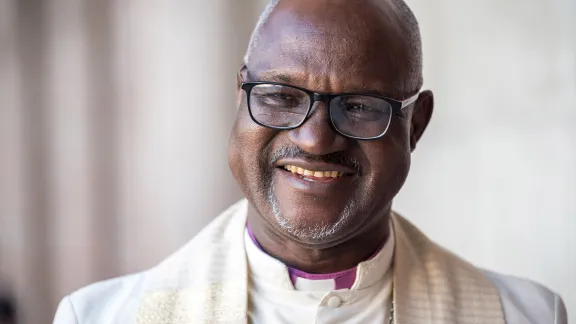
LWF President Archbishop Dr Panti Filibus Musa. Photo: LWF/Albin Hillert
LWF President Musa reflects on new challenges and need to ensure no one is left behind
(LWI) - In the aftermath of the Coronavirus (COVID-19) pandemic, Lutherans must learn to redefine their role in society as they continue “to advocate and to ensure that no-one is left behind.” At the conclusion of an online Executive Committee meeting on 16 June, the President of the Lutheran World Federation (LWF), Nigerian Archbishop Dr Panti Filibus Musa, says people must not become complacent but must adapt to the new challenges of a post COVID-19 world.
The archbishop who also serves as head of the Lutheran Church of Christ in Nigeria (LCCN), was due to welcome members of the LWF Council to the Nigerian capital Abuja for their annual meeting in June. He says there was disappointment that the encounter had to be cancelled because of the pandemic but also relieved that “we were not caught in the middle of lockdown while travelling, in transit or at the Council.”
“We are also grateful for the gift of technology,” President Musa continues, “which has allowed us to meet as the Executive Committee and take decisions that have been referred to us by members of the Council. The Communion goes on in the midst of these lockdowns and isolation, so we thank God that we have ways of connecting, of continuing to walk with each other and look into the future beyond COVID-19.”
Responding as a communion
The LWF president praises the many member churches which have intensified their diaconal activities, advocacy, awareness raising and education campaigns, collaborating with state actors to try and slow the spread of the disease. He notes how some churches initially saw the virus as a purely “spiritual problem of people who have sinned,” prompting LWF leaders to provide theological and pastoral guidance. “No-one can deal with this by themselves,” he insists, “and we know that we are still not out of the woods yet.”
Archbishop Musa expresses profound gratitude to churches and other partners who have supported the LWF’s Rapid Response Fund, set up to support congregations facing unprecedented challenges as a result of the pandemic. “We are so thankful to member churches who, despite their own challenges, were willing to contribute to this fund so that, as a communion, we were able to respond as the body of Christ within society,” he says.
“We know some communities around the world where lockdown has been extremely difficult but where churches have tried to ensure that all folks who have lost livelihoods are accompanied and supported. Beyond that, they’ve advocated to ensure that the response of governments is fair and we are so grateful that churches have taken this active role, both globally and locally,” the archbishop says.
Serving the most vulnerable
Since the start of the pandemic, he adds, “our Department for World Service has been responding to the challenges of the pandemic among particularly vulnerable people, especially the refugees and displaced communities. Crucially, we have been able to do this without abandoning other lifesaving activities that we provide as a global communion.”
Noting the increase in domestic violence that has taken place during lockdown in many countries, the LWF president says it is vital to continue “saying no to violence, especially against women and children.” He says the letters circulated by the LWF leadership at the start of the crisis “encouraged and empowered churches to rise up and respond to this, and we have examples of some churches that have concretely developed programs particularly addressing this issue during COVID-19.”
Looking forward, Archbishop Musa says it is important “to acknowledge the fears and anxiety, because COVID-19 has affected all dimensions of human life and we have to learn to live with a new reality.” Urging people not to become complacent as lockdown is lifted in some countries but infection rates continue to rise in others, he says: “My hope and prayer is that state actors and governments will not retreat into themselves in this time of crisis. My call, if I can borrow the theme of the UN Sustainable Development Goals which we are also using, is that no one is left behind, as we begin to hope and see a post COVID-19 period.”
We are hopeful and we will continue meeting, discussing and reflecting together about the church’s changing role
The LWF president warns of the risk that ongoing conflicts and crises may be forgotten as world leaders prioritize recovery from the problems provoked by the pandemic. “We should be wary of forgetting about other issues because we know that violence still goes on, around the world and in our context, in Nigeria, extremist activities still go on, people are killed, we have increased numbers of orphans and widows, so we must look at it from a comprehensive perspective,” he stresses.
While the LWF may be affected by the global financial consequences of the crisis and will have to “redefine what we do in line with available resources,” the LWF President insists the church has learnt over the years to reshape its role within changing societies. “We are hopeful and we will continue meeting, discussing and reflecting together about this changing role,” he concludes. “The world is not going to be the same anymore, so the church must learn to adapt too.”


